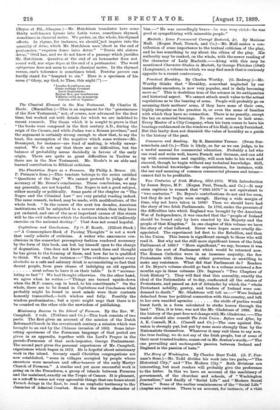Two Centuries of Irish History, 191 - 1870. With Introduction by James
Bryce, M.P. (Kegan Paul, Trench, and Co.)—It may seem captious to remark that "1691-1870 " is not equivalent to " two centuries." Dr. Bryce's contributions do not end too soon, but they do not begin soon enough. Having a wide margin of time, why not have taken in 1689? Then we should have had the story of two Irish Parliaments. In 1783, under the pressure of the difficulties into which England was brought by the American War of Independence, it was enacted that the "people of Ireland should be bound only by laws enacted by his Majesty and the people of that Kingdom." In one chapter of this volume we have the story of what followed. Never were hopes more cruelly dis- appointed. The experiment led first to the Rebellion, and then to the Union. This lesson is significant enough to those who will read it. But why not the still more significant lesson of the Irish Parliament of 1689 ? "More significant," we say, because it was exactly the sort of Parliament which would be returned now. The Roman Catholics were in an immense majority, the few Protestants with them being either powerless or unwilling to make any resistance. What did that Parliament do ? Readers of Dr. Bryce's volume should go back to a volume reviewed a few months ago in these columns (Dr. Ingram's "Two Chapters of Irish History"). They will fmd that this assembly, exactly the ideal of the Nationalists of to-day, confiscated all the estates of Protestants, and passed an Act of Attainder by which the " whole Protestant nobility, gentry, and traders of Ireland were con- demned to death." Mr. Gladstone will tell us :—" Were Ireland detached from her political connection with this country, and left
t to her own unaided agencies the strife of parties would burst forth in a form calculated to strike horror through the land." This, it is true, was not the Mr. Gladstone of 1889. But the history of the past does not change with Mr. Gladstone. —The reader should also consult The Irish Union : Before and After, by A. K. Connell, M.A. (Cassell and Co.)—The case against Dis- union is strongly pat, but put by none more strongly than by the Nationalists themselves. Whatever it may suit them to say now, the true feeling, we do not say of the Irish people, but of some of their most trusted leaders, comes out in Mr. Sexton's words,—" The one prevailing and unchangeable passion between Ireland and England is the passion of hate."


































 Previous page
Previous page